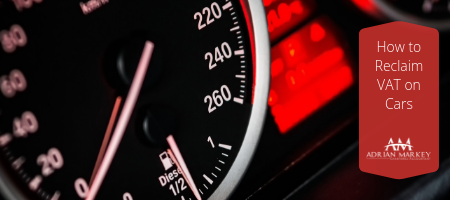Reclaiming VAT on cars has always been difficult. HMRC always argued that if a car was not “wholly and exclusively” for the business, VAT could not be reclaimed. In essence, if a company car was used to travel 1 non-business mile, a reclaim of VAT was not possible. Proving that a vehicle had not ever been used privately was difficult. HMRC has, understandably, never documented what evidence it would require to allow such a reclaim. Whilst this still remains the case, a number of recent cases have set the roadmap to allow for VAT reclaims.
One issue these cases addressed was around the intent to use a company vehicle for personal journeys. It’s next to impossible to prove personal use didn’t/won’t happen. However, if the company takes the appropriate steps, it can show that it’s intent is that the car will only be used for business purposes. If it can do that, a reclaim of input VAT should be allowed. With £5,000 of VAT to reclaim on a £30,000 car, it’s easy to see why taxpayers are keen to reclaim and HMRC are intent on blocking them. So, what do you need to do to reclaim?
1. Insure the car for business use only
If you only insure a vehicle for business use this is a pretty strong indicator that you only intend to use it for business. Private use would leave the company directly liable for any claim arising from a private journey. As such, it can be inferred the car is intended for business use only.
2. Instruct all potential users of the car that it is to be used for business purposes only
By informing all staff that the vehicle is for business use only it goes further to back up the intent of its use. Get employees to counter sign a declaration that they agree to the restriction of use of the vehicle.
3. Insert a stipulation in employment contracts
Further enforce point two by including a clause in the contract of employment that employees agree not to use company cars for private use. They should also agree to return pool cars to the business premises at night. In 2016, the first tier tribunal, in the case of Jane Barton, sided with the taxpayer in reclaiming VAT even though her business premises was at her home address. So even though the car was kept at her home, this also doubled as her business address and was deemed acceptable.
4. Get the paperwork right
As well as employee declarations and amendments to employment contract, a detailed mileage log is invaluable to a successful reclaim of VAT. Again, a clause could be inserted in the employment contract that employees agree to log all journeys in a mileage log. Also consider having the directors pass a board resolution restricting the use of the vehicle to business use only.
Summary
If the above points are followed, a reclaim of VAT should be allowed. It’s worth noting however, some taxpayers have won their case in the First Tier Tribunal without hitting all the above points. In 2016, Zone Contractors Ltd were allowed their reclaim of VAT even though there were no restriction to the insurance policy. There were also concerns over the credibility of the mileage logs. However, the legal and physical restrictions (stipulation in the employment contracts and requiring the vehicle to be stored at business premises overnight) were enough to side with the taxpayer.
Each case is very much decided on its own merits. However, if all the above steps are taken, there should be little or no room for HMRC to argue that the car is not intended for business purposes.



